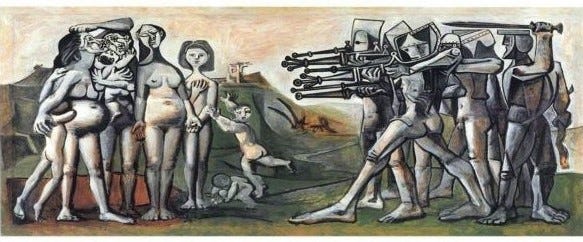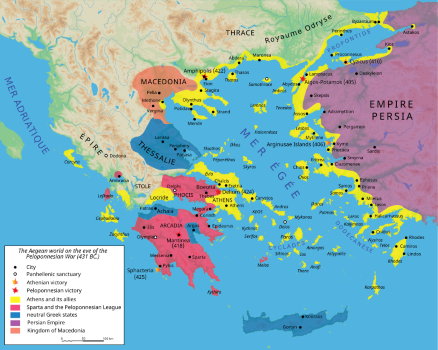Democracy and War (I)
An unfortunate and indisputable fact of history is democracies proved no better at peace than oligarchy, monarchy, or tyranny. Using the present United States, ancient Rome, and ancient Athens as examples, it wouldn't be controversial to say they often proved most bellicose.
Democratic peace is achieved in internal affairs by the enfranchised citizenry’s nonviolent conduction of domestic politics. This alone is in starkest contrast to the often violent domestic politics of every other political order. Domestically, the Roman republic's politics were relatively violence free for over three centuries. At the same time of this internal peace, Rome spread from their initial seven hills to conquer an empire. There's an old, if not ancient joke, that Rome conquered the world defending themselves. From its inception Rome was constantly at war, so too the United States from its founding, and democratic Athens across its almost two-century existence.
One of the greatest wars of all three democracies was the Peloponnesian War. An almost 30 years war fought between Athens and its oligarchic Greek rival Sparta, immortalized in Thucydides' History of the Peloponnesian War. In recent years, this work has been trotted out and butchered in interpretation in every imaginable way by half-weight intellectual, full fanged jingoists promoting the misguided war policies of America's National Security State.
I was introduced to both Thucydides and this butchering in my last semester of college, when I took an excellent class reading just this one book. I greatly liked the professor, but we had a lot of disagreements on interpretation. His whole purpose was to try and use it as a direct Cold War analogy – the US as Athens and Sparta as the Soviet Union. This was a stretch in many ways, either completely superfluous or at other times more accurate in ways the professor cared to admit. The class was as exercise in the founding Jesuit tradition of bastardizing the classics for contemporary political need, first inaugurated by founder Ignatius' initial campaign in defense of the papacy. Such twisted exercises can still be valuable, as long as you understand every intention.
Thucydides was both an Athenian participant in and chronicler of the war. His book is invaluable beyond its honored reputation, no more so for chronicling the Athenians' unquenchable war lust that proved fatally detrimental when at various times peace would have served them much better. Of all the book's lessons, this one remains most lost to America today.
After the Greeks defeated the Persians in 479 BC, the following decades saw Athens, with their new navy, become the premier power of the Hellenes. Many of the other Greek city-states were forced or voluntarily allied to Athens’ Delian League. All these cities paid some sort of tribute to Athens, giving the city a large bounty allowing splendors such as Pericles rebuilding and expanding the Persian destroyed temples of the Acropolis. Today, their ruins still scatter sunlight from atop the Acropolis along with reflecting the felonious faded imperial light inside the British Museum.
By 431, tensions grew between Athens and many of the Greek states, including those within the League itself. The war began with open hostilities initiated between the Spartan allied Corinth and Athenian allied Corcyra. One of the greatest aspects of Thucydides' work are the speeches. Political arguments that, as Thucydides notes, are not verbatim, but poetically seek to stringently offer the positions and spirit of each particular side.
The speeches could come straight from the floor of the Congress today. Ok, that's a joke. They are all far superior to anything DC can presently produce, but in general the arguments for war are not just similar, but exact. At the war's commencement, the Corinthians address their Spartan allies nailing the Athenians' character, traits that proved repeatedly self-destructive over the course of the war. The Corinthians astutely recognize,
“The Athenians are addicted to innovation, and their designs are characterized by swiftness alike in conception and execution... They are adventurous beyond their power, and daring beyond their judgment, and in danger they are sanguine.”
Adding,
“They toil on in trouble and danger all the days of their life, with little opportunity for enjoying, being ever engaged in getting: their only idea of a holiday is to do what the occasion demands, and to them laborious occupation is less of a misfortune than the peace of a quiet life. To describe their character in a word, one might truly say that they were born into the world to take no rest themselves and to give none to others.”
Two and half thousand years later a pretty good summing up of the character, or least much of the past character of the United States, excepting, especially most recently, the notion of sanguine in danger – America today is a pathologically fearful place.
It's pretty much without contention Athens was truly at fault for the war. As Thomas Mitchell writes in his excellent, Athens: A History of the World’s First Democracy,
“The Athenians were careful not to start the war, but took decisions likely to provoke it. They certainly made no effort to avert it. Confident of victory, they clung to their goal of primacy through power, and preferred confrontation to the policy of peaceful coexistence and a share in the leadership of Greece in alliance with Sparta.”
Sound familiar?
The war was tragic for Athens from the get-go. A year after the war began, the city was hit by a devastating plague, thousands if not tens of thousands died, including one of history's greatest democratic figures, Pericles. Mitchell writes of the loss,
“In defence of Pericles, however, it must be said that he had built the military resources and a strategy likely to deliver victory and, while he bears a responsibility for the start of the war, he was not responsible for its calamitous outcome.”
The greatest continual lesson of all war is it doesn’t end the way those most responsible for starting think it will.
The war changed Athens. New, crudely bellicose figures came to prominence playing on the demos (people) general pro-war fervor. These new demagogues continually attacked the better counsel of those pressing for peace. Thucydides accusingly points at Cleon as representing this new figure best. Cleon owed his wealth to the empire and constantly provoked war fever while violently assaulting the character of his opposition.
The war went back and forth for the next eight years. Both sides gained victories and experienced close to disastrous defeats. When Cleon and his Spartan counterpart were killed, both sides agreed to a cessation of hostilities known as the Peace of Nicias, which lasted for six years. In the last battle before the peace, an Athenian defeat, Thucydides, leading an Athenian force, arrives late, resulting in his exile, allowing him to commence writing his book.
The Peace of Nicias lasts six somewhat turbulent years, with Athens' war party constantly agitating for a return to hostilities, even though it was far and away in Athens’ best interest not to. At the same time, a new generation of Athenians were rising to power, those who had grown up in the pampered circumstances of the pinnacle of Athens’ imperial wealth and power. Call them Athenian Boomers. Mitchell writes,
“A new generation of young aristocrats was coming to the fore in Athenian politics. They had grown up in the 440s and 430s at the height of Athenian power and prosperity, and had experienced the new education and the full influence of the intellectual revolution that had came with the Sophists. Their lifestyle soon attracted the writers of comedy, who ridiculed their penchant for long hair, extravagant, foppish dress, addiction to drink, horses and sexual diversions, and their general lack of seriousness, discipline and commitment to duty.”
Mitchell continues,
“But a more sinister feature of the young aristocrats in Athens was the pronounced militarism and political radicalism spreading among them. They were ambitious in the extreme, with new ideas of power and its uses and benefits. In the Suppliants of Euripides, produced about 420 and set in the age of Theseus, but with contemporary themes and messages, the young are described as hungry for honour and war and command and power and wealth, with no thought for morality or the welfare of citizens.”






